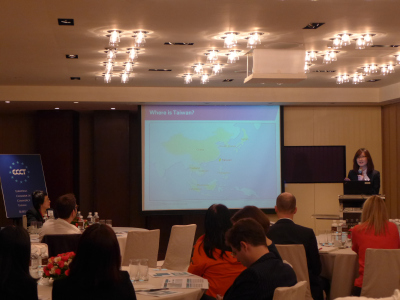Taiwan tax workshop

The presentation began with a general overview of Taiwan before moving on to detailing the various types of taxes in Taiwan. While Taiwan has a number of national and local taxes, its corporate tax rate (17%) is quite low compared to most developed countries. For example, Australia's rate is 30%, China's is 25%, France's is 33.33% and Japan's is 38%. Taiwan's VAT rate is also relatively low at just 5%.
Taiwan's tax revenue as a percentage of GDP was only 12.4% in 2012, compared to 14.2% in Singapore, 13% in Hong Kong, 26.8% in South Korea, 26.9% in the United States and 39% in the United Kingdom.
Individual taxes account for the largest percentage of tax revenues. Taiwan's maximum individual income tax rate, at 40% is relatively high compared to Singapore's 20% but lower than Australia and China's 45%, France's 45% (with talk of raising this to 75% by the current president) and Japan's 50%.
Lee gave an overview of the rules of Taiwan's Value-Added Tax (VAT), withholding tax (WHT), alternative minimum tax (AMT) and surtax on retained earnings, compliance requirements, common non-deductible items, tax losses, thin capitalization rules, ruling applications, available incentives, transfer pricing, undistributed retained earnings.
Business tax is imposed on the sale of goods and services within Taiwan, as well as importation of goods into Taiwan.
Lee went on to talk about the Government Uniform Invoice (GUI) system before moving on to tax filing. Generally, VAT returns are required to be filed bi-monthly. Filings are generally to be made by the 15th of every other month for the two preceding months. Fortunately, the GUI system makes the VAT filing relatively simple and audits relatively straightforward.
Corporate taxes need to be filed no later than five months after the tax year end (no extensions are permitted). A CPA certification is required because the process is complicated and a lot of information is needed. Failure to comply with the rules can result in fines. Companies may apply for advanced tax rulings to make sure they will not fall foul of the rules.
Doing R&D in Taiwan has tax benefits because Taiwan allows up to 15% of R&D expenditures incurred to be claimed as a tax credit. The amount of the tax credit is limited to 30% of the income tax payable in the current year. Various R&D tax incentives are applicable to specific industries.
Generally, a foreign company will be liable for Taiwan income tax only to the extent it derives Taiwan sourced income (TSI), which is subjected to 20% WHT. It is the responsibility of the Taiwanese company to act as the withholder and determine whether or not it is Taiwan sourced income. WHT is a real burden since it is higher than the corporate income tax rate of 17%. The WHT rate may be reduced by tax treaties or other avenues. For example, the WHT rate with most of Taiwan's treaty partner countries is generally around 10%. In addition, with prior approval granted by tax authorities, for items such as technical services, only 15% of the service fee would be deemed as taxable income and subject to 20% withholding tax. In such cases, the effective tax rate could be reduced from 20% to 3% (that is, 15% the deemed profit rate multiplied by 20% of the statutory withholding tax rate). However, a detailed review of the scope of service and the agreement would be required to assess the likelihood of obtaining the relevant approval.
As of 31 December 2012, 25 countries have signed Dual Taxation Agreements with Taiwan including the UK, the Netherlands, France, Germany, Switzerland and Slovakia. The International Fiscal Affairs Department is working on increasing the number of treaties but it does not disclose which countries it is negotiating with.
Lori Lai ended the presentation with some advice on filing personal income tax returns in Taiwan. She also outlined many of the legal expense deductions available to expatriates in Taiwan.
